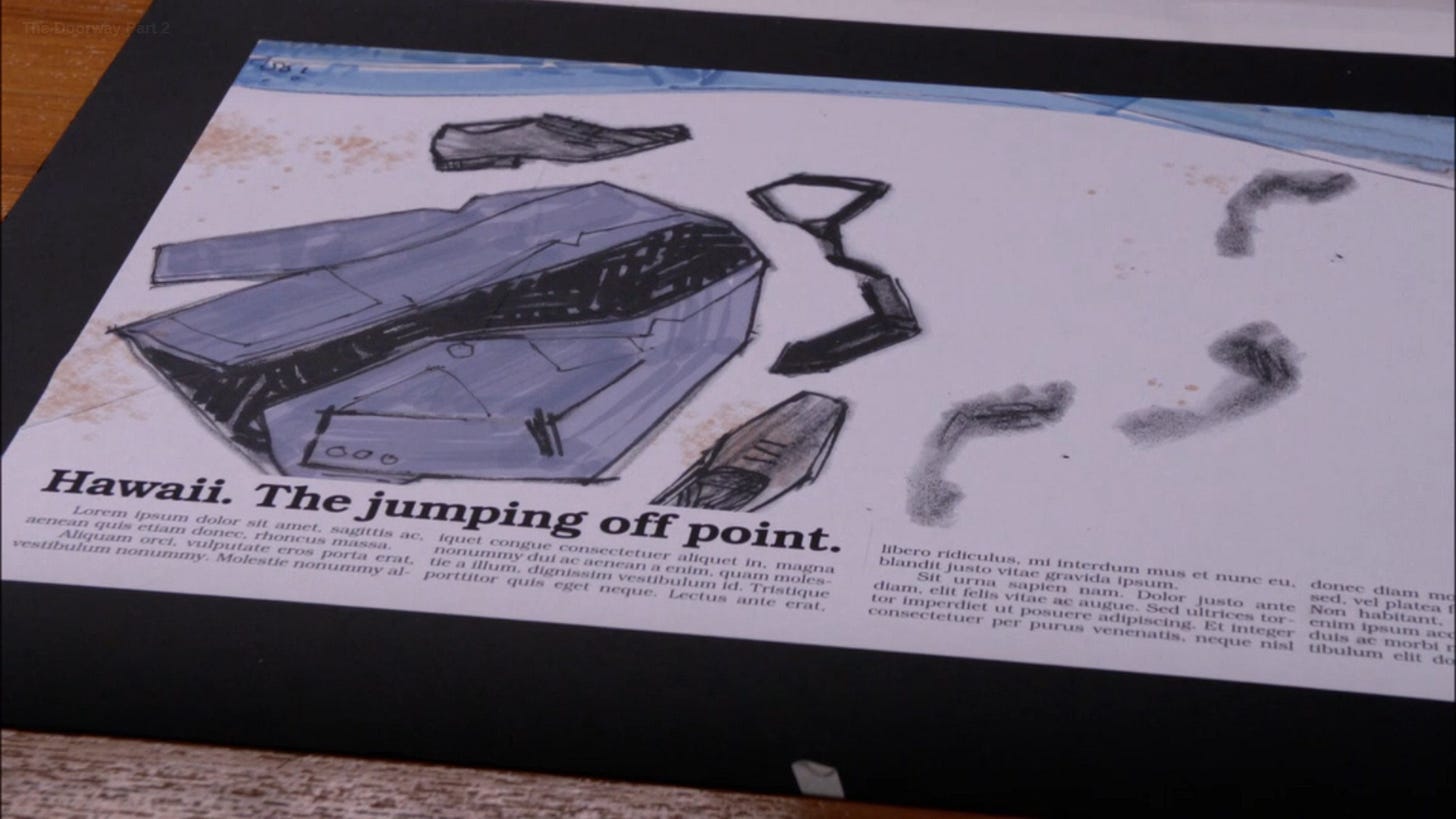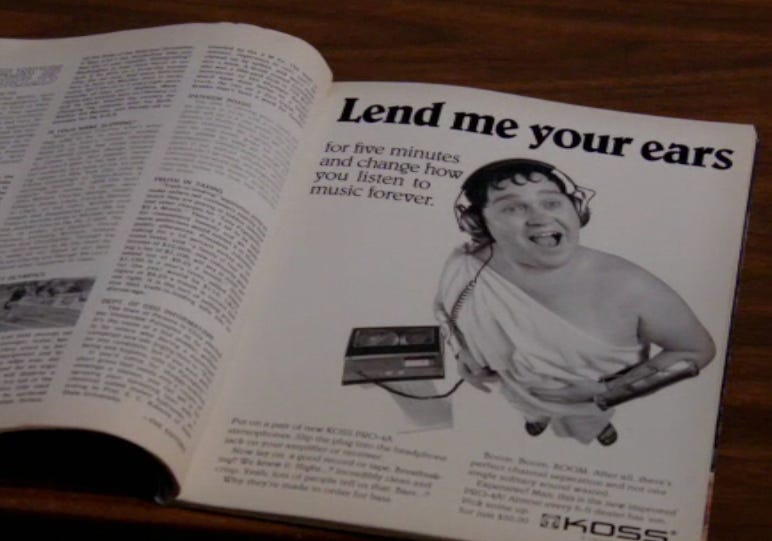Season 6: Episode 2
“The Doorway Part 2”
Written by Matthew Weiner
Directed by Scott Hornbacher
Setting: December 1967 to January 1968
The many changes of life are immediately identifiable in a writer's work.
No writer is the same after they have a child. Issues of family and parenthood become more apparent in their works. Steven Spielberg has said that the ending of Close Encounters of the Third Kind, where Richard Dreyfus, without hesitation, abandons his wife and children to go hang out with aliens, no longer sat well with him after he became a father.
Stephen King’s work became noticeably different after he got sober, and then again after he survived a near-fatal accident where a van struck him.
Birth, marriage, divorce, addiction, sobriety. A writer cannot wear a mask and hide their feelings from the world. No matter the story they are telling, their reflections on the changes of life will come out.
By Season 6 of Mad Men, Matthew Weiner began to fear death.
We all fear death, and some writers like Woody Allen remind us of that fear in almost everything they write, but this is different. This is an attempt to make peace with that fear.
There could be any number of reasons why Weiner decided to explore the fear and fascination with death so head-on in Season 6’s opening two-parter “The Doorway” and I am going to throw a new theory out there.
He isn’t mourning and fearing his eventual death but rather Mad Men’s death.
“The Doorway” ends as 1968 begins. There are only two years of the 1960s left. Imagining those years while he wrote the show’s first episode set in March of 1960 likely felt impossible.
It’s the same way that if I said “Imagine what you’re doing in 2033” so many people think “2033! That’s not a real year, who are we the Jetsons?
Time passes so quickly, 2025 was once a faraway future to us and soon enough it will be a faraway past.
Season 7 is the actual end of Mad Men but Season 6 is the preparation. I’ve realized how necessary it is for the show’s eventual ending impact.
All things must end but nothing is gone.
A picture becomes even more powerful because of how beautiful the memory is.

Death is such an encompassing unknown that people abandon life after facing it.
Witnessing his doorman’s heart stop didn’t make Don reconsider his own life. He knows that anyone can drop dead in a moment and uses that apparently meaningless certainty to justify selfish actions.
He attempted to live a good life in Season 5 and then came to the crushing realization that everything he was fighting for actually meant nothing to him. Don does not recognize his own life. He left an island heaven in Hawaii and returned to the funeral of a woman he had never really known.
If one has to die, shouldn’t it be on a beach in the Sun rather than a skyscraper in New York?

Don misses the feeling that he is alive, and unfortunately, he only feels it in something new.
A wedding on a beach with strangers is life.
For him, another dinner at home with Megan is not.
Don seeks out something new, no matter how poisonous it is, because it is a change. He is beyond the point of pretending but that only means he will be honest in his fears and failures.

Neighbor Sylvia Rosen enters into an affair with Don because he is an exciting and attractive adventure who is the total opposite of her balding and rather dull husband who leaves her whenever his hospital calls.
Don enters into an affair with Sylvia because he can. He isn’t in love with her, the affair was an opportunity to remind himself that he is alive. Instead, he feels as if he is walking through Hell and always looking for the exit.
A drunken Don forcefully asks his doorman if he “saw a light when he died.” The response is more or less “I guess.” The one character who actually “died” does not think much about death, whereas the characters who have all the money and glamour in the world are obsessed with it.
Roger finds himself more haunted by the prospect of a meaningless life than death itself. He feels next to nothing after the passing of his mother for this reason.
She was a rich socialite who brought smiles to people in her death not because they remembered the good life she led but because she might have left money to them.

Roger is later devastated when he discovers that his shoe shiner has died and left him his shine box.
Roger was “everything” to his mother but her death changed nothing. He only had one fewer person to talk to on the phone.
The shoe shiner left his entire world in a box for Roger to have. That’s something that means more than money can buy.
Making peace with death and the deaths of those you love is the only path to a good life. That road begins by acknowledging how present “the end” is in our lives. Peggy has to pitch an alternate ad when a morbid connection is drawn between her “lend me your ears” headphones commercial and U.S. soldiers collecting the ears of their enemies in Vietnam.
There is more laughter than horror at the revelation because of a joke told on The Tonight Show but also because the horror has become so overwhelming. People choose to laugh in madness at death rather than let horror control their lives.
We mourn deaths, protest unjust killings, and acknowledge that life continues despite everything. There is a balance between the two. A good life has an end but every action is not made feeling “I will die someday.”
Mad Men has always been the photograph that Don looks back on fondly.
It is an impossible past that we yearn for and are given every reason not to recreate.
A doorway opens and shows you every other door you need to walk through. Many hope that the final door opens to a light, while others have made peace believing that it holds nothing.
For everyone, look back at the doors you have walked through. You will see the most important certainty.
You have walked through them.
Don keeps opening new doors in a desperate search for light or nothingness. Instead, he finds mirrors showing how many empty frames are behind him.
He’s looking for life in those doorways but finding only reminders that he will die. You have lived and will keep on living. You die the day you decide you only lived once in a photograph that each second is farther away.









